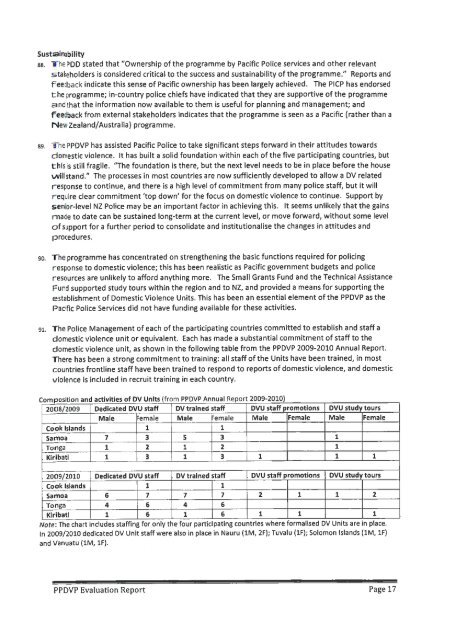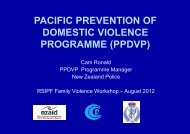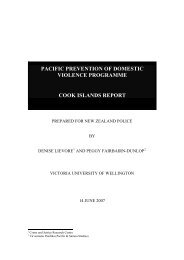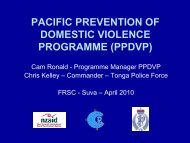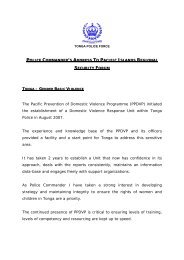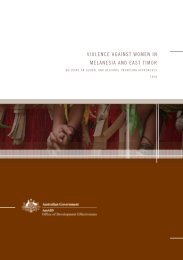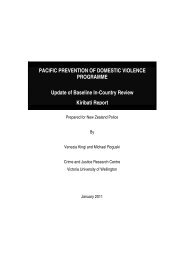PPDVP Evaluation Report - Pacific Prevention of Domestic Violence ...
PPDVP Evaluation Report - Pacific Prevention of Domestic Violence ...
PPDVP Evaluation Report - Pacific Prevention of Domestic Violence ...
Create successful ePaper yourself
Turn your PDF publications into a flip-book with our unique Google optimized e-Paper software.
Sustainability8s. ThePOD stated that "Ownership <strong>of</strong> the programme by <strong>Pacific</strong> Police services and other relevantstakeholders is considered critical to the success and sustainability <strong>of</strong> the programme." <strong>Report</strong>s andfeedback indicate this sense <strong>of</strong> <strong>Pacific</strong> ownership has been largely achieved. The PlCP has endorsedthe programme; in-country police chiefs have indicated that they are supportive <strong>of</strong> the programmeand that the information now available to them is useful for planning and management; andfeedback from external stakeholders indicates that the programme is seen as a <strong>Pacific</strong> (rather than aNew Zealand/Australia) programme.89. The <strong>PPDVP</strong> has assisted <strong>Pacific</strong> Police to take significant steps forward in their attitudes towardsdomestic violence. It has built a solid foundation within each <strong>of</strong> the five participating countries, butchisis still fragile. "The foundation is there, but the next level needs to be in place before the housewill stand." The processes in most countries are now sufficiently developed to allow a DV relatedresponse to continue, and there is a high level <strong>of</strong> commitment from many police staff, but it willrequire clear commitment 'top down' for the focus on domestic violence to continue. Support bysenior-level NZ Police may be an important factor in achieving this. It seems unlikely that the gainsmade to date can be sustained long-term at the current level, or move forward, without some level<strong>of</strong> support for a further period to consolidate and institutionalise the changes in attitudes andprocedures.go.The programme has concentrated on strengthening the basic functions required for policingresponse to domestic violence; this has been realistic as <strong>Pacific</strong> government budgets and policeresources are unlikely to afford anything more. The Small Grants Fund and the Technical AssistanceFund supported study tours within the region and to NZ, and provided a means for supporting theestablishment <strong>of</strong> <strong>Domestic</strong> <strong>Violence</strong> Units. This has been an essential element <strong>of</strong> the <strong>PPDVP</strong> as the<strong>Pacific</strong> Police Services did not have funding available for these activities.91. The Police Management <strong>of</strong> each <strong>of</strong> the participating countries committed to establish and staff adomestic violence unit or equivalent. Each has made a substantial commitment <strong>of</strong> staff to thedomestic violence unit, as shown in the following table from the <strong>PPDVP</strong> 2009-2010 Annual <strong>Report</strong>.There has been a strong commitment to training: all staff <strong>of</strong> the Units have been trained, in mostcountries frontline staff have been trained to respond to reports <strong>of</strong> domestic violence, and domesticviolence is included in recruit training in each country., 2009/2010 . Dedicated DVU staff . DV trained staff . DVU staff promotions . DVU study tours, cook Islands11. Samoa67 7 721 1 2. Tonga 46 4 6, Kiribati 1 6 1 6 1 11Note: The chart includes staffing for only the four participating countries where formalised DV Units are in place.In 2009/2010 dedicated DV Unit staff were also in place in Nauru (lM, 2F); Tuvalu (IF); Solomon Islands (IM, IF)and Vanuatu (IM, IF).<strong>PPDVP</strong> <strong>Evaluation</strong> <strong>Report</strong> Page 17


